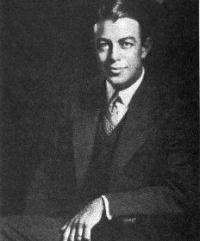Benjamin Lee Whorf: Difference between revisions
Jump to navigation
Jump to search

Pablo Sender (talk | contribs) No edit summary |
Pablo Sender (talk | contribs) No edit summary |
||
| Line 8: | Line 8: | ||
===Articles=== | ===Articles=== | ||
*[http://www.theosophical.org/publications/quest-magazine/1324# A Notable Theosophist: Benjamin Lee Whorf] by John Algeo | *[http://www.theosophical.org/publications/quest-magazine/1324# A Notable Theosophist: Benjamin Lee Whorf] by John Algeo | ||
*[http://sloan.stanford.edu/mousesite/Secondary/ | *[http://davidlavery.net/writings/mind_of_whorf.pdf# The Mind of Benjamin Whorf] by David Lavery | ||
*[http://sloan.stanford.edu/mousesite/Secondary/ThoughtReality.htm# Language, Mind and Reality] by Benjamin L. Whorf | |||
==Further reading== | ==Further reading== | ||
Revision as of 16:15, 13 November 2012

Benjamin Lee Whorf (April 24, 1897 – July 26, 1941) was an American linguist and fire prevention engineer, and a member of the Theosophical Society (Adyar). Whorf is widely known as an advocate for the idea that because of linguistic differences in grammar and usage, speakers of different languages conceptualize and experience the world differently. This principle has frequently been called the "Sapir–Whorf hypothesis", after him and his mentor Edward Sapir, but Whorf called it the principle of linguistic relativity, because he saw the idea as having implications similar to Einstein's principle of physical relativity.
Online resources
Articles
- A Notable Theosophist: Benjamin Lee Whorf by John Algeo
- The Mind of Benjamin Whorf by David Lavery
- Language, Mind and Reality by Benjamin L. Whorf
Further reading
- Carroll, John B. (ed.) Language, Thought, and Reality: Selected Writings of Benjamin Lee Whorf (Cambridge, Mass.: Technology Press of Massachusetts Institute of Technology, 1956) x, 278 pp.
